 Petzlover
Petzlover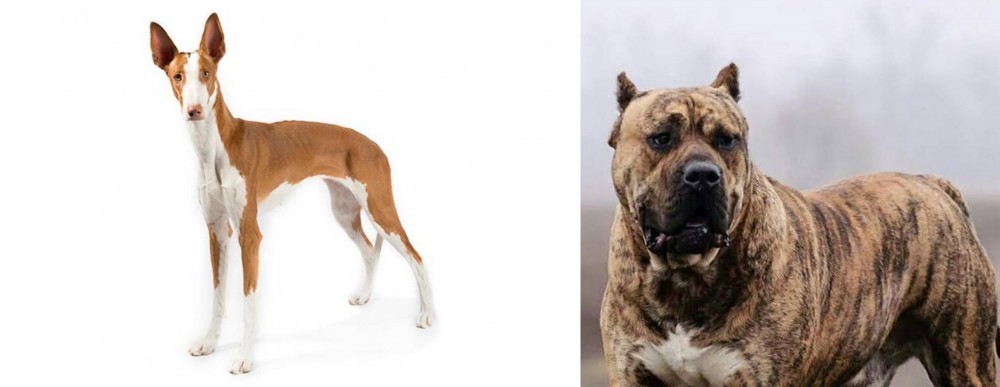 Both Ibizan Hound and Perro de Presa Canario are originated from Spain. Ibizan Hound may grow 8 cm / 4 inches higher than Perro de Presa Canario. Ibizan Hound may weigh 41 kg / 90 pounds lesser than Perro de Presa Canario. Both Ibizan Hound and Perro de Presa Canario has same life span. Both Ibizan Hound and Perro de Presa Canario has almost same litter size. Both Ibizan Hound and Perro de Presa Canario requires Low Maintenance.
Both Ibizan Hound and Perro de Presa Canario are originated from Spain. Ibizan Hound may grow 8 cm / 4 inches higher than Perro de Presa Canario. Ibizan Hound may weigh 41 kg / 90 pounds lesser than Perro de Presa Canario. Both Ibizan Hound and Perro de Presa Canario has same life span. Both Ibizan Hound and Perro de Presa Canario has almost same litter size. Both Ibizan Hound and Perro de Presa Canario requires Low Maintenance.
 This lean, speedy and agile hound dog looks and acts very much like a Pharaoh Hound except the Ibizan Hound is larger and a different color. The image of dogs that look like the Ibizan have been seen since 3400 BC in Egypt. The dogs were probably brought by sailors to Ibiza and surrounding islands. They came about 700-900 BC. It is believed that they actually came for the island of Elvissa and Spain, where they speak Catalan. It was also known in France as the le chanigue. There job was the same. To hunt rabbits.
This lean, speedy and agile hound dog looks and acts very much like a Pharaoh Hound except the Ibizan Hound is larger and a different color. The image of dogs that look like the Ibizan have been seen since 3400 BC in Egypt. The dogs were probably brought by sailors to Ibiza and surrounding islands. They came about 700-900 BC. It is believed that they actually came for the island of Elvissa and Spain, where they speak Catalan. It was also known in France as the le chanigue. There job was the same. To hunt rabbits.
They were fast hunting greyhound type dogs. They hunted for rabbit for the Ibizaners and themselves. These dogs hunt by day and by night. They are not just sight hounds, they also hunt by smell and hearing, in packs or by themselves. They use their sight to find and corner the prey. Then they act like retrievers and bring it back to the hunter. Their function and look is very similar to several other dogs such as the Pharaoh Hound, the Greyhound, the Portuguese Podengo, the Cimeco dellEtna and the Podence Canario. The Ibizan is larger than any of these, but all these breeds are considered to be “primitive”.
Within the breed itself there are smooth, wire and longhaired Ibizan Hounds. The Smooth is by far the most common. A great jumper, nimble runner built for stamina, the Ibizan Hound was just what the island people needed. The breed lived in isolation on the island for many centuries, under a variety of rulers including the Romans, Egyptians, Vandals, Carthaginians, Chaldeans, Arabs and Spanish. Because of the harsh island conditions, the farmers only allowed the best hunters among the Ibizan Hounds to procreate thus assuring a breed that is unchanged from ancient stock.
By 1950 the Ibizan Hound was brought to America. Because this dog is not a pet but a working machine, it took awhile for the breed to become popular enough to be recognized by the American Kennel Club (AKC) in 1979. Still the Ibizan Hound is a rare breed with the female being a better hunter than the male. One of the most common activities of this breed in the U.S. is lure coursing. These events are sponsored by AKC and ASFA as well as racing events in the NOTRA and LGRA.
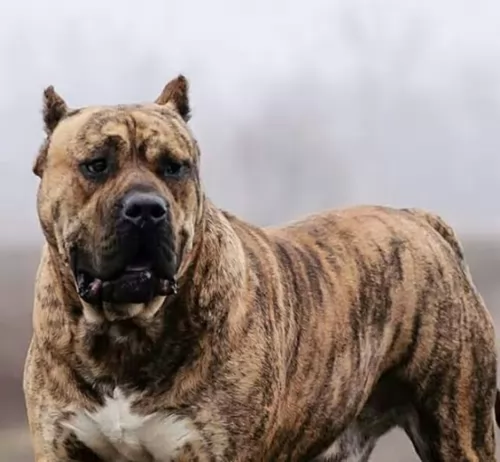 This large dog, also known as the Canary Mastiff, is a rare Molosser-type dog hailing from the Canary Islands.
This large dog, also known as the Canary Mastiff, is a rare Molosser-type dog hailing from the Canary Islands.
It does appear as if, according to records, that these dogs were also consumed at one time. The dog has also been used as a cattle dog as well as being used for dog fighting till the middle of the 1900s. Dog fighting was prohibited in the 1940s but it continued for a number of decades.
As people became interested in other dog breeds, the Presa nearly died out but some breeders revived the breed because of it having some good characteristics – territorial, brave, protective and intelligent. The FCI recognized the dog in 2011.
 The breed is agile, elegant, athletic and graceful. At the same time the Ibizan Hound is a fierce hunter travelling at unreal speeds to catch his rabbit prey. They are a hardy breed with a lean and long neck, and a lean, muscled body with laid back shoulders. The ears are specific to the breed, with a broad base leading to long, beautiful ears. They have tan eye rims, nose, foot pads, and ears. The eyes themselves are an amber with an intelligent and alert expression.
The breed is agile, elegant, athletic and graceful. At the same time the Ibizan Hound is a fierce hunter travelling at unreal speeds to catch his rabbit prey. They are a hardy breed with a lean and long neck, and a lean, muscled body with laid back shoulders. The ears are specific to the breed, with a broad base leading to long, beautiful ears. They have tan eye rims, nose, foot pads, and ears. The eyes themselves are an amber with an intelligent and alert expression.
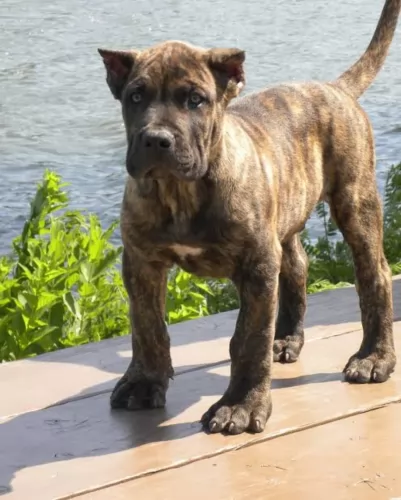 The Perro de Presa Canario or Canary Dog is large and muscular. He stands at 58 to 66cm in height and weighs anything from 40 – 70kg. He has a deep bark.
The Perro de Presa Canario or Canary Dog is large and muscular. He stands at 58 to 66cm in height and weighs anything from 40 – 70kg. He has a deep bark.
The head is broad and the ears are normally cropped to give him a more aggressive appearance. With ear cropping being banned the ears are close fitting to the head and are floppy. This is one of those dogs where the rear of the dog is slightly higher than the shoulders.
The coat is short and there is no undercoating. It is available in all different shades of fawn and brindle. The breed standard requires the dog having a black mask.
Canine experts tell us that this large working dog has got such fearless guardian characteristics that they wouldn’t recommend this dog for first time dog owners. On the other hand however, there are dog owners who claim that with good socialization, this dog becomes docile and amicable around their human family.
He is a clever dog so training and socialization will be easy and it will be worth it. This is a dog noted for its strength, it’s strong personality and potential for aggression, so training and socialization will be most important.
 They love children but be careful they do not knock them over and don’t let the children play to rough.
They love children but be careful they do not knock them over and don’t let the children play to rough.
Exceptional jumping ability, speed and stamina.
Must have a large fenced yard and a place to run full out.
Very intelligent with excellent learning ability.
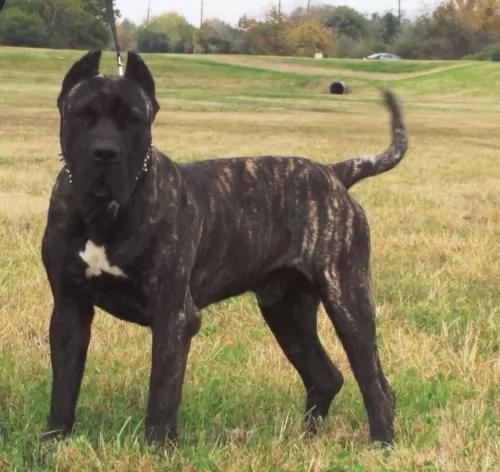 Contrary to what many people think, the Perro de Presa Canario can be a calm, gentle dog when trained and socialized properly.
Contrary to what many people think, the Perro de Presa Canario can be a calm, gentle dog when trained and socialized properly.
It is only when you bring an older, unknown dog into your midst that you would have to exercise caution with him as he can then be aggressive.
Dogs become dangerous and aggressive when they are brought up by aggressive, uncaring people. Humans are always to blame for the way a dog turns out. Provide this large dog with a loving, caring home, and he’ll show you what a remarkable pet he can be.
 Despite being isolated on the islands for all those years, the Ibizan Hound has several tendencies toward medical issues:
Despite being isolated on the islands for all those years, the Ibizan Hound has several tendencies toward medical issues:
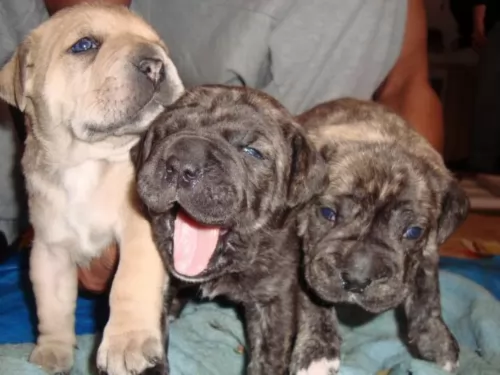 The Perro de Presa Canario can live to be between 8 and 12 years of age. Being a large breed the dog can be susceptible to hip dysplasia and other problems such as cancer and heart problems. It is highly unlikely that a well cared for dog will get any of these illnesses.
The Perro de Presa Canario can live to be between 8 and 12 years of age. Being a large breed the dog can be susceptible to hip dysplasia and other problems such as cancer and heart problems. It is highly unlikely that a well cared for dog will get any of these illnesses.
It is far better to give your dog two smaller meals a day as opposed to one bigger meal as then he tends to wolf his food down. This can lead to bloat, where the stomach swells up and worse, it twists. This dangerous situation prevents fluid and air from escaping the stomach. Your dog is restless, he paces and salivates, wanting to vomit. Bloat can affect any dog at any age.
Kidney disease can develop because of some other illness or it can develop on its own. It can even be caused by bad teeth when bacteria enters the bloodstream of the dog.
 Your Ibizan Hound is an athlete and needs to be fed like one. As a puppy he needs high quality breed or group (hound) specific food. Feed her 3-4 times a day based on calories. A puppy needs about 866 calories each day.
Your Ibizan Hound is an athlete and needs to be fed like one. As a puppy he needs high quality breed or group (hound) specific food. Feed her 3-4 times a day based on calories. A puppy needs about 866 calories each day.
If your dog participates in sports as adults, they need between 1450 and 2900 calories each day. The exact amount depends on how much activity the dog is engaged in. Feed at least 2 times a day.
Great speed and stamina
Your Ibizan Hound is a working athlete. He needs a lot of exercise and he needs a chance to run full out so access to land is essential. It can be a large back yard, or it can be a dog park. No matter what it is, it is essential for the Ibizan Hound. She will also require long walks at least a couple times a day. However, do not over exercise your puppy. They are great jumpers as well as runners.
The sport of lure coursing was made for the Ibizan in the same way that it was made for the Greyhound. They are good at Flyball and agility as well.
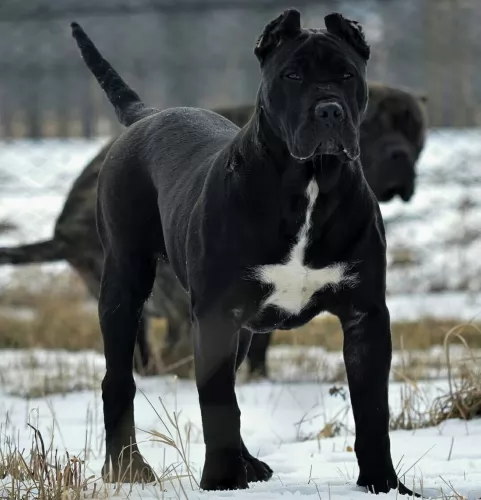 This is a short haired dog, and he isn't a heavy shedder so beyond regular twice-a-week brushing he will simply need to have his eyes and ears checked for infections.
This is a short haired dog, and he isn't a heavy shedder so beyond regular twice-a-week brushing he will simply need to have his eyes and ears checked for infections.
He will also need to have his nails clipped and to check his teeth over too. A sore, bad tooth at the back of your pet’s mouth can cause terrible pain but also play havoc with his general health.
Your Perro de Presa Canario is a high-energy dog and he will need daily exercise. He will love a good walk but he will also need something more strenuous and demanding such as ball- and rope tug-of-war games.
Try and provide your large pet with a top quality commercially manufactured food – one that is packed with vitamins and minerals instead of colorants preservatives and toxic fillers.
Break the monotony of feeding him only kibble by mixing in some cooked chicken, brown rice, sweet potato, carrots and spinach. Dogs love consistency and simplicity and simple meals like this with some raw meat thrown in occasionally will keep him healthy and happy. Never leave him without a constant supply of fresh, cool water.